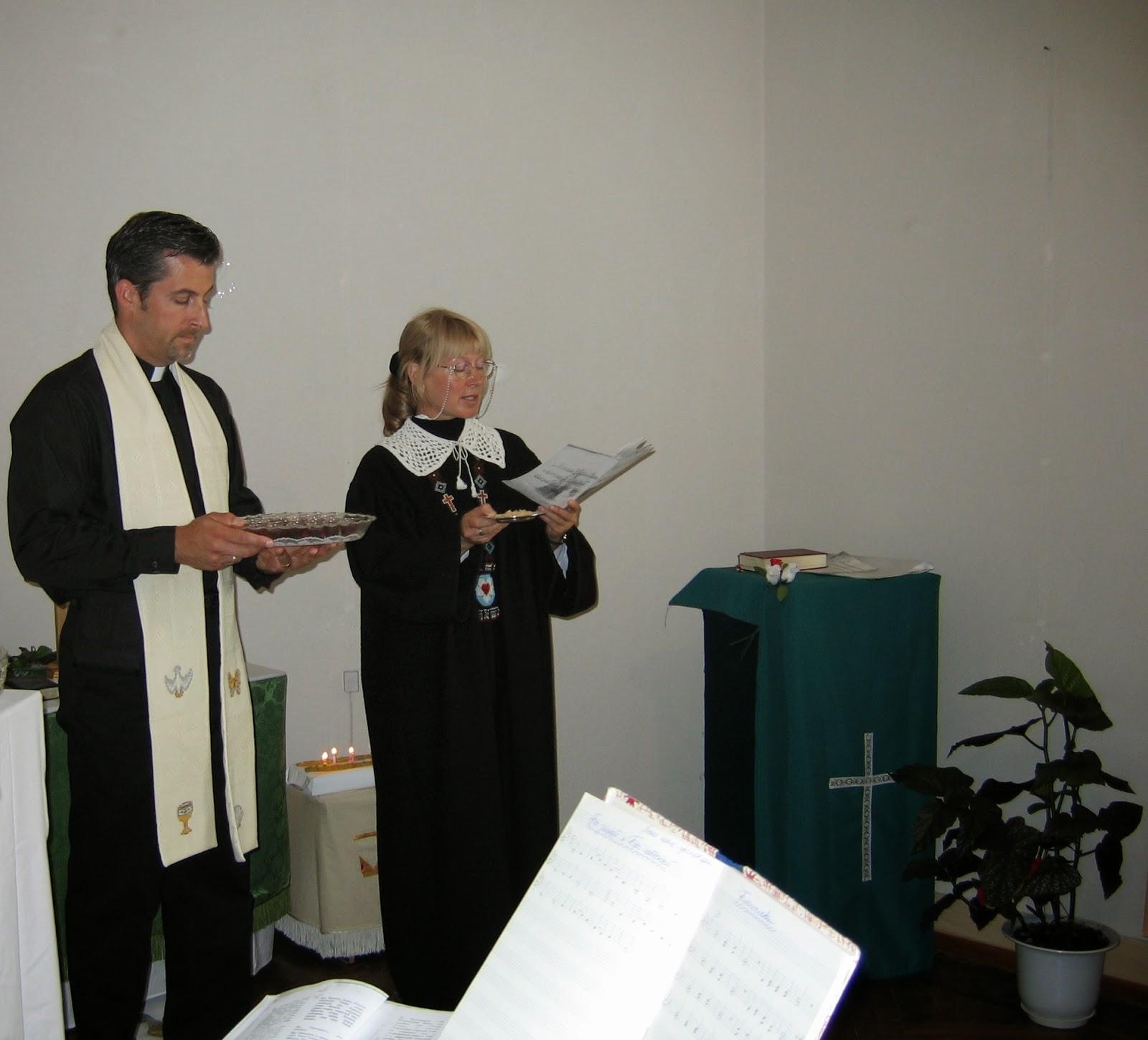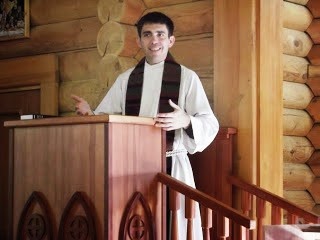Holy Cross
has had a Russian Ministry for about 14 years, though few are aware of it today
– what it is, why it was created, what its goals are.
For many of
us, Russia remains a country shrouded in mystery and political intrigue, a
country where spies operate, people disappear, and even your hotel room is
searched while you’re at breakfast. Russia is synonymous with the Cold War. Today’s
headlines regarding the unrest in the Ukraine and Crimea only serve to
underscore the perception that Russian leadership is not to be trusted.
 |
| Building that houses St. Mark's |
Yet in these
past 14 years, Holy Cross has sent two delegations to Magadan, in the Russian
far east, and in return two delegations have visited here. We have lent our
support to St. Mark’s Lutheran Church in Magadan, and more recently, changed
our focus to support a Lutheran pastor serving as a missionary in Russia.
Perhaps it
would be helpful to look back at when the Russian Ministry was first formed.
Pastor Michael Peck had a connection with Manfred Brockmann, provost (dean) of the ELCA Russian
Far East synod, and invited him to speak at Holy Cross after learning he was in
the area. Pastor Brockmann had a list of congregations that needed support, one
of which was St. Mark’s in Magadan. “There was something about St. Mark’s that
appealed to Holy Cross,” Pastor Mike said. “I think that part of what appealed
to us is that it was a community really cut off.”
Magadan’s
history is somewhat dark and cruel. It’s a port city on the Sea of
Okhotsk, and once served
as a major transport center for prisoners sent to work in Stalin’s prison labor
camps. Even today, memories of the GULAG times, an acronym for Main
Administration of Corrective Labor Camps and Labor Settlements, permeate the
area. Archival Soviet
data estimates that 1.6 million people died during the period from 1929
to 1953.
 |
| Pastor Mike and Alla at St. Mark's in Magadan |
At the time Pastor Brockmann spoke at Holy Cross, there
was a resurgence of religion in Russia, coming after years of oppression. Alla
Vysokova, the pastoral leader of St. Mark’s, wrote in a letter to Holy Cross
dated February, 2002: “Our community is only one year old and it is still
small.” She went on to say, “Every Sunday we have God service and Bibll lesson.
On the God service we many sing.”
Her letter marked an ongoing correspondence that
continued while she was the leader at St. Mark’s. Correspondence was one of the
goals, according to Linda Leffler, who came to the Russian Ministry by way of
the Prayer Ministry. Linda had traveled to China and met people who couldn’t worship without fear of
persecution, and so could identify with people in Russia living with the same
fear. “They were afraid to have a written roster of members,” Linda said of St.
Mark’s, “for fear of harassment.” Linda said that the Prayer Ministry sent a
prayer book to Pastor Alla, with prayers they could pray together weekly.
Norm Smith also got involved through the Prayer Ministry, and shared his impressions during his visit to Magadan in 2001. "We found no one on the street in Magadan smiled, the kids did not talk or laugh or even look us in the eye as we walked down the street," Norm said. "We found that a lot of the attendees to the church did not become members because they were afraid that the Russian government was still spying on them and that would be held against them if they knew."
Norm Smith also got involved through the Prayer Ministry, and shared his impressions during his visit to Magadan in 2001. "We found no one on the street in Magadan smiled, the kids did not talk or laugh or even look us in the eye as we walked down the street," Norm said. "We found that a lot of the attendees to the church did not become members because they were afraid that the Russian government was still spying on them and that would be held against them if they knew."
Kathie
Walter’s interest in the Russian Ministry came from the synod level. She and her
husband, Alan, traveled to Vladivostok, at the invitation of Pastor Brockmann, to teach basic Bible knowledge
and Lutheran doctrine as part of the companion synod effort. Kathie remarked that
during the Communist regime, many churches were destroyed, and some were used
as military hospitals.
 |
| Congregation of St. Mark's in Magadan |
During its
partnership with St. Mark’s, Holy Cross purchased a second-story flat where the
congregation could worship. Kathie said it was a series of rooms that included
a kitchen, bedroom and worship space. The congregation also purchased a
computer to aid communication. Last fall, Holy Cross furnished a door and
locks, so that part of the flat could be turned into living quarters for the
new permanent pastor, Juris Simakins, who is scheduled to arrive in July or
August this year.
One can only
get to Magadan by plane or boat. Pastor Mike said when he traveled there in
2005, the flight path from Anchorage, Alaska to Magadan was dangerous, and
planes only flew in and out of Magadan once a week, on a Friday. He said during
his week in Magadan, he presided over a baptism, and visited an orphanage. “Most
of the children were in the orphanage because their parents are alcoholics and
can’t take care of them,” Pastor Mike said. The rampant alcoholism in Magadan
is the result of a variety of factors, including poverty, lack of jobs, and the
common role vodka plays in culture. But even in such a culture, Pastor Mike
said, he wasn’t surprised to see a church arise. “It’s a group of people with a
common bond, who come together to support each other,” he said. Norm found the same on his earlier visit. "I cannot stress enough how gracious the congregation was and how excited they were to work with us as we both moved forward," he said.
 |
| Pastor Bradn Buerkle preaching in Tomsk |
Holy Cross
continued its relationship with St. Mark’s even after Alla left, though she
provided the sole means of communication. Others who were involved through the
years are Tricia Hinton, Kristina Arteaga, Norm and Carol Barney, and
Julie Brainard. Eventually, the Russian Ministry knew it would need to change
its focus, and has since formed a missionary sponsorship covenant to support ELCA
pastor and missionary Bradn Buerkle.
Pastor
Buerkle writes a blog as he can, and recently addressed the situation in Russia
and Ukraine. You can read it at russiancorrespondent.blogspot.com. He and his
wife recently welcomed the birth of their third child, and all are well and
home in St. Petersburg.
The goals of
the Russian Ministry are to invite the congregation to learn about the Russian history
and culture, to keep Pastor Buerkle and his family in prayer as they spread the
Gospel in Russia, and to offer financial support as necessary. Freedom of
worship remains a real challenge in Russia, considering that President Putin
named the Russian Orthodox Church as the de facto official religion.
Congregations still run the risk of being visited by agents of the F.S.B., a
successor of the K.G.B., and labeled a “sect” and shut down.
Next time
you’re at Holy Cross, check out the Russian Ministry display inside the front
doors. You’ll see a traditional Russian samovar, Christmas card, collection of
rocks, photos, and other artifacts of our relationship with St. Mark’s in
Magadan.

No comments:
Post a Comment